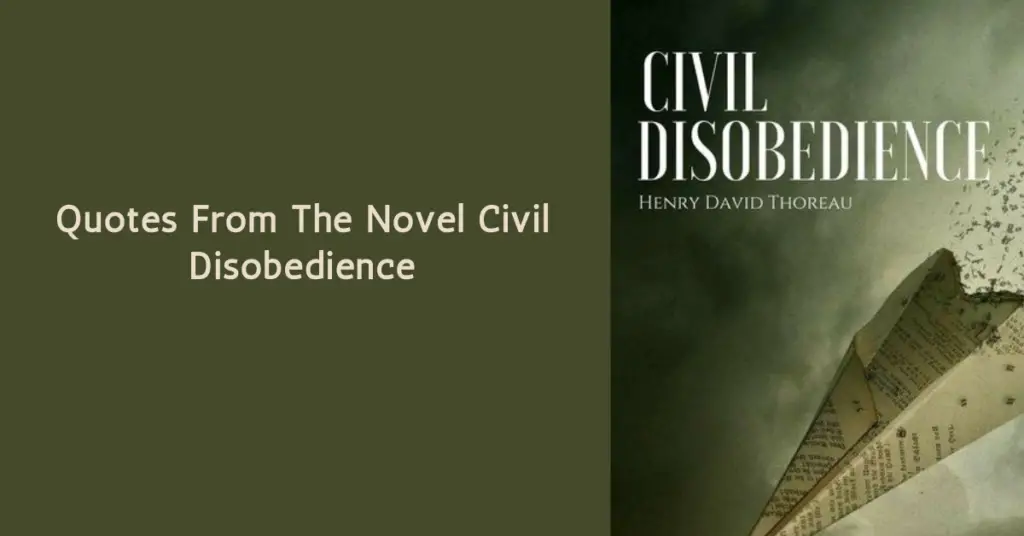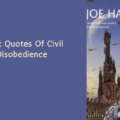Introduction
Henry David Thoreau’s work has timeless lessons. His Civil Disobedience highlights the power of individuality. The text offers rich insights into freedom and moral action. Quotes From The Novel Civil Disobedience capture Thoreau’s bold ideas on government and personal ethics. They urge us to reflect on justice and action.
One thing that makes this novel special is its direct language. Thoreau speaks straight to the reader’s conscience. From inspirational quotes from the novel civil disobedience to lines about individual responsibility, each thought feels alive today. It’s not just about rebelling—it’s about doing what’s right.
Ever wondered about the civil disobedience quotes explained or their deep meanings? These words touch on human duty and ethics. The novel itself is rooted in personal resistance to unjust laws. This topic has sparked countless essays, including quotes from the novel civil disobedience essay assignments over the years.
Readers often ask, when was civil disobedience written? It was published in 1849. Even then, its ideas were revolutionary. The book has since inspired movements worldwide.
If you’re diving into this classic, try reading it alongside the Thoreau Civil Disobedience summary for clarity. Whether it’s about justice or nature, Thoreau’s words resonate deeply. His principles still challenge and guide us. So, as you read, let these thoughts provoke and inspire action. After all, change begins with the courage to disobey wrongs.
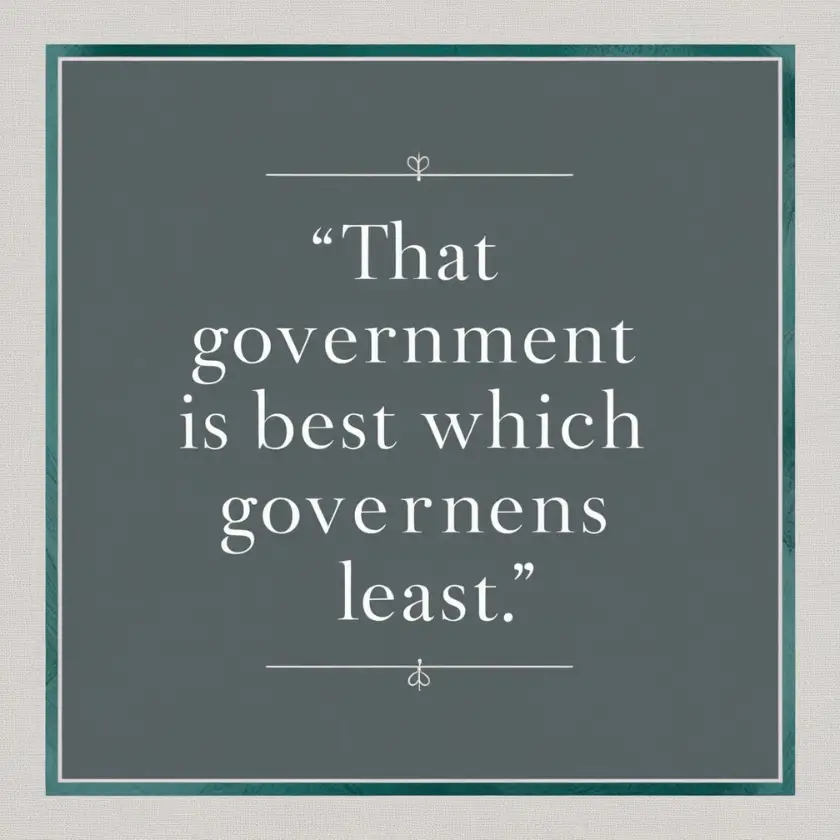
Profound Wisdom: Quotes From The Novel Civil Disobedience
- “That government is best which governs least.”
This quote emphasizes the value of minimal governance and individual freedom. It is one of the most famous quotes from the novel Civil Disobedience, showing Thoreau’s belief in personal responsibility over government interference. - “Under a government which imprisons any unjustly, the true place for a just man is also a prison.”
Thoreau challenges the morality of supporting unjust systems, a recurring theme in quotes from the novel Civil Disobedience essay, making this a cornerstone of civil rights advocacy. - “Let your life be a counter friction to stop the machine.”
An invitation to resist injustice actively, this stands out among inspirational quotes from the novel Civil Disobedience for its direct call to action. - “If a thousand men were not to pay their tax bills this year, that would not be a violent and bloody measure, as it would be to pay them and enable the State to commit violence and shed innocent blood.”
This highlights Thoreau’s advocacy for nonviolent resistance, offering insight into Civil Disobedience quotes explained in the context of ethical governance. - “I quietly declare war with the State, after my fashion.”
A powerful example of individual defiance, this line resonates with readers who explore the Civil Disobedience story for its bold stance on personal integrity. - “A man is not a man unless he refuses to be a tool of the government.”
This profound statement reflects Thoreau’s views on personal agency, making it a key part of the Thoreau Civil Disobedience summary often taught in schools. - “The character inherent in the American people has done all that has been accomplished; and it would have done somewhat more, if the government had not sometimes got in its way.”
One of the inspirational quotes from the novel Civil Disobedience, this line praises individual initiative over governmental control. - “Disobedience is the true foundation of liberty. The obedient must be slaves.”
A stark contrast to conformity, this quote underlines Thoreau’s belief in active resistance and is one of the Civil Disobedience quotes with page numbers that inspire activism. - “The only obligation which I have a right to assume is to do at any time what I think is right.”
A definitive statement on morality, this is among famous quotes from the novel Civil Disobedience, inspiring readers to prioritize conscience over compliance. - “Even voting for the right is doing nothing for it. It is only expressing to men feebly your desire that it should prevail.”
Thoreau critiques passive political participation here, a point often explored in Civil Disobedience quotes explained sections of literature studies. - “If the law requires you to be an agent of injustice to another, then, I say, break the law.”
This radical declaration is central to quotes from the novel Civil Disobedience essay, urging ethical disobedience when faced with injustice. - “I think that we should be men first, and subjects afterward.”
Highlighting the primacy of individuality over state control, this quote stands out in the Civil Disobedience story as a timeless appeal for personal integrity. - “The mass of men serve the state thus, not as men mainly, but as machines, with their bodies.”
This critique of blind obedience emphasizes the value of conscious action, often cited in Thoreau Civil Disobedience summary discussions. - “Can there not be a government in which majorities do not virtually decide right and wrong, but conscience?”
A revolutionary question, this is one of the most inspirational quotes from the novel Civil Disobedience, challenging the ethics of majority rule. - “I ask for, not at once no government, but at once a better government.”
This foundational quote reflects Thoreau’s desire for reform rather than anarchy, central to Civil Disobedience quotes with page numbers that explain his nuanced stance. - “The authority of government, even such as I am willing to submit to, is still an impure one.”
Thoreau critiques the flawed nature of government, a recurring theme in famous quotes from the novel Civil Disobedience that promotes critical thinking. - “I have paid no poll-tax for six years. I was put into a jail once on this account.”
This anecdote highlights Thoreau’s commitment to his beliefs and is often explored in quotes from the novel Civil Disobedience essay as a real-life example of civil disobedience. - “Any man more right than his neighbors constitutes a majority of one already.”
A powerful affirmation of individual conviction, making it one of the most inspirational quotes from the novel Civil Disobedience for change-makers. - “It is not desirable to cultivate a respect for the law, so much as for the right.”
A quote that challenges blind obedience to laws, central to Thoreau Civil Disobedience summary discussions in academic settings. - “A minority is powerless while it conforms to the majority.”
Thoreau’s critique of passive conformity makes this one of the Civil Disobedience quotes explained in detail to understand its advocacy for active resistance. - “If injustice is part of the necessary friction of the machine of government, let it go.”
This provocative statement invites debate, a key element in Civil Disobedience story interpretations. - “Let every man make known what kind of government would command his respect, and that will be one step toward obtaining it.”
Thoreau’s emphasis on individual agency and responsibility is a cornerstone of famous quotes from the novel Civil Disobedience. - “There will never be a really free and enlightened State until the State comes to recognize the individual as a higher and independent power.”
A vision for a more ethical state, this line often appears in Civil Disobedience quotes explained sections for its forward-thinking philosophy.
Moral Courage: Quotes From The Novel Civil Disobedience
- “A wise man will not leave the right to the mercy of chance, nor wish it to prevail through the power of the majority.”
This quote highlights the importance of individual judgment over collective decision-making, resonating deeply with the core of Quotes From The Novel Civil Disobedience. - “There is but little virtue in the action of masses of men.”
Thoreau emphasizes the superiority of individual morality over mob mentality, a key aspect often analyzed in the Civil Disobedience story and summaries. - “Action from principle, the perception and the performance of right, changes things and relations.”
A timeless reminder of the transformative power of integrity, this is one of the famous quotes from the novel Civil Disobedience that inspires personal responsibility. - “What I have to do is to see, at any rate, that I do not lend myself to the wrong which I condemn.”
Thoreau stresses the importance of aligning actions with principles, making this quote central to Civil Disobedience quotes explained in ethical discussions. - “If the injustice is of such a nature that it requires you to be the agent of injustice to another, then, I say, break the law.”
A compelling call for moral resistance, this quote defines the essence of Quotes From The Novel Civil Disobedience and its lasting relevance. - “They hesitate, and they regret, and sometimes they petition; but they do nothing in earnest and with effect.”
This critique of passive resistance serves as a rallying cry for active change, highlighted in discussions about inspirational quotes from the novel Civil Disobedience. - “The true place for a just man is also a prison.”
Thoreau’s defiance of unjust laws exemplifies his commitment to principle over convenience, often included in Civil Disobedience quotes with page numbers to underline the sacrifices of integrity. - “A corporation of conscientious men is a corporation with a conscience.”
This statement reflects Thoreau’s belief in ethical collective action, resonating with readers exploring famous quotes from the novel Civil Disobedience. - “If a plant cannot live according to its nature, it dies; and so a man.”
A profound metaphor for the necessity of authenticity, this line is central to Civil Disobedience story interpretations. - “The law will never make men free; it is men who have got to make the law free.”
Thoreau’s focus on proactive efforts for justice is a recurring theme in Quotes From The Novel Civil Disobedience, urging readers to strive for liberty. - “There are thousands who are in opinion opposed to slavery and to the war, who yet in effect do nothing to put an end to them.”
This critique of apathy among the majority makes it one of the most impactful Civil Disobedience quotes explained for its relevance across eras. - “The rich man is always sold to the institution which makes him rich.”
A bold critique of wealth and power dynamics, this quote is central to discussions in Thoreau Civil Disobedience summary studies. - “If the law is of such a nature that it requires you to inflict injustice upon others, then I say, break the law.”
Thoreau’s stance on prioritizing ethics over compliance makes this a hallmark of Quotes From The Novel Civil Disobedience. - “The progress from an absolute to a limited monarchy, from a limited monarchy to a democracy, is a progress toward a true respect for the individual.”
A thought-provoking reflection on political evolution, often cited in Civil Disobedience story explorations. - “We should be men first, and subjects afterward.”
A timeless call for prioritizing humanity over societal roles, this remains central to discussions about Quotes From The Novel Civil Disobedience. - “The government itself, which is only the mode which the people have chosen to execute their will, is equally liable to be abused and perverted.”
A critical observation on governance, this line appears frequently in Civil Disobedience quotes with page numbers to highlight Thoreau’s distrust of unchecked power. - “There are nine hundred and ninety-nine patrons of virtue to one virtuous man.”
A commentary on the disparity between intention and action, often explored in famous quotes from the novel Civil Disobedience to discuss personal accountability. - “It is not so important that many should be as good as you, as that there be some absolute goodness somewhere.”
Thoreau emphasizes the value of unwavering moral standards, making this quote a cornerstone of inspirational quotes from the novel Civil Disobedience. - “Law never made men a whit more just.”
A stark critique of the limits of legislation in fostering morality, this statement is essential in discussions about Civil Disobedience story and its ethical implications. - “When a sixth of the population of a nation which has undertaken to be the refuge of liberty are slaves, and a whole country is unjustly overrun and conquered by a foreign army, it is not too soon for honest men to rebel and revolutionize.”
A rallying cry against systemic injustice, this line is a pivotal element of Civil Disobedience quotes explained for its call to action.
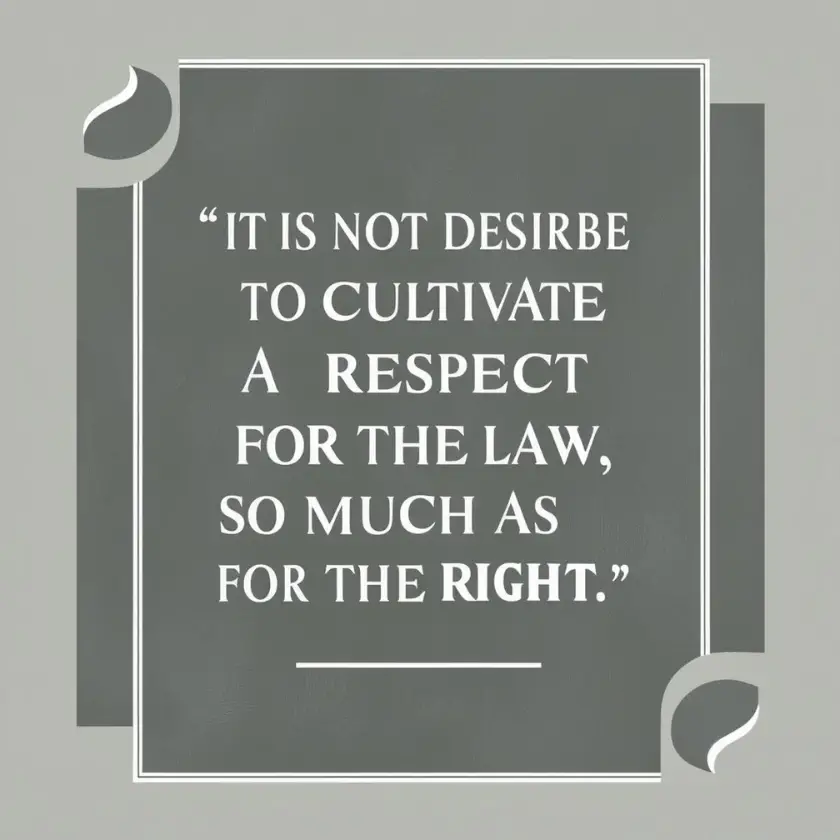
Defiance and Individuality: Quotes From The Novel Civil Disobedience
- “It is not desirable to cultivate a respect for the law, so much as for the right.”
This quote underscores the need for personal morality over blind obedience to laws, a core idea in Quotes From The Novel Civil Disobedience. - “Even voting for the right is doing nothing for it.”
Thoreau challenges passive political actions, emphasizing that true change requires more than symbolic gestures, making this a central point in Civil Disobedience story discussions. - “Under a government which imprisons any unjustly, the true place for a just man is also a prison.”
A bold assertion that resonates with themes of civil disobedience, this is a standout among famous quotes from the novel Civil Disobedience. - “Any man more right than his neighbors constitutes a majority of one already.”
A powerful declaration of individual power, this is often explored in inspirational quotes from the novel Civil Disobedience for its uplifting message. - “What is once well done is done forever.”
Thoreau emphasizes the lasting impact of principled actions, reflecting the enduring relevance of Quotes From The Novel Civil Disobedience. - “I cannot for an instant recognize that political organization as my government which is the slave’s government also.”
A potent critique of moral compromise in governance, this quote frequently appears in Civil Disobedience quotes explained for its moral clarity. - “If the injustice is part of the necessary friction of the machine of government, let it go, let it go.”
Thoreau advocates for resistance only when injustice becomes intolerable, a nuanced idea in the Civil Disobedience story. - “The best government is that which governs not at all.”
A provocative statement about the role of government, this quote is integral to understanding Quotes From The Novel Civil Disobedience. - “Cast your whole vote, not a strip of paper merely, but your whole influence.”
Thoreau calls for wholehearted commitment to justice, a sentiment central to Civil Disobedience story themes. - “The mass of men serve the state thus, not as men mainly, but as machines, with their bodies.”
A sharp critique of unthinking obedience, this line encapsulates a key argument in Civil Disobedience quotes explained. - “If a thousand men were not to pay their tax bills this year, that would not be a violent and bloody measure.”
Thoreau highlights nonviolent resistance as a powerful tool for change, reinforcing the essence of Quotes From The Novel Civil Disobedience. - “Disobedience is the true foundation of liberty.”
A timeless assertion, this quote captures the spirit of Thoreau’s work and its focus on principled rebellion. - “The authority of government, even such as I am willing to submit to, is still an impure one.”
Thoreau critiques even the best governments, underscoring his belief in individual sovereignty as a key takeaway from Quotes From The Novel Civil Disobedience. - “As for adopting the ways which the state has provided for remedying the evil, I know not of such ways.”
This acknowledgment of systemic flaws is central to the arguments in Civil Disobedience quotes explained and critiques of societal norms.
Freedom Through Resistance: Quotes From The Novel Civil Disobedience
- “Let every man make known what kind of government would command his respect, and that will be one step toward obtaining it.”
Thoreau urges citizens to define their ideals and take proactive steps to achieve them, a profound lesson from Quotes From The Novel Civil Disobedience. - “There are thousands who are in opinion opposed to slavery and to the war, who yet in effect do nothing to put an end to them.”
This quote critiques passive opposition, emphasizing the need for action, as explored in Civil Disobedience quotes explained. - “The character inherent in the American people has done all that has been accomplished; and it would have done somewhat more if the government had not sometimes got in its way.”
Thoreau praises individual initiative while critiquing governmental interference, a theme central to famous quotes from the novel Civil Disobedience. - “Unjust laws exist; shall we be content to obey them, or shall we endeavor to amend them, and obey them until we have succeeded?”
This powerful query challenges readers to consider their role in shaping justice, resonating deeply within Civil Disobedience story discussions. - “Action from principle—the perception and the performance of right—changes things and relations; it is essentially revolutionary.”
A cornerstone of Thoreau’s philosophy, this quote encapsulates the transformative power of morality in Quotes From The Novel Civil Disobedience. - “The only obligation which I have a right to assume is to do at any time what I think right.”
Thoreau prioritizes personal morality over societal expectations, a sentiment central to his arguments in Civil Disobedience story. - “I am too high-born to be propertied, to be a secondary at control, or useful serving man and instrument to any sovereign state throughout the world.”
This poetic declaration of independence reflects the individualism championed in Quotes From The Novel Civil Disobedience. - “There will never be a really free and enlightened State until the State comes to recognize the individual as a higher and independent power.”
Thoreau envisions a government that respects individual autonomy, a recurring theme in Civil Disobedience quotes explained. - “A man has not everything to do, but something; and because he cannot do everything, it is not necessary that he should do something wrong.”
Thoreau advises against compromise in principles, a key takeaway from Quotes From The Novel Civil Disobedience. - “How can a man be satisfied to entertain an opinion merely and enjoy it?”
This rhetorical question critiques passive intellectualism, advocating for action as emphasized in Civil Disobedience story themes. - “There is no odor so bad as that which arises from goodness tainted.”
Thoreau critiques hypocrisy in moral actions, a subtle yet impactful statement in famous quotes from the novel Civil Disobedience. - “I quarrel not with far-off foes, but with those who, near at home, cooperate with, and do the bidding of, those far away.”
This highlights the complicity of local actions in distant injustices, an idea central to Civil Disobedience quotes explained. - “The rich man is always sold to the institution which makes him rich.”
A critique of wealth and moral compromise, this quote resonates within the broader arguments of Quotes From The Novel Civil Disobedience. - “What is the price-current of an honest man and patriot today?”
Thoreau challenges the commodification of values, making this a striking line in Civil Disobedience story interpretations.
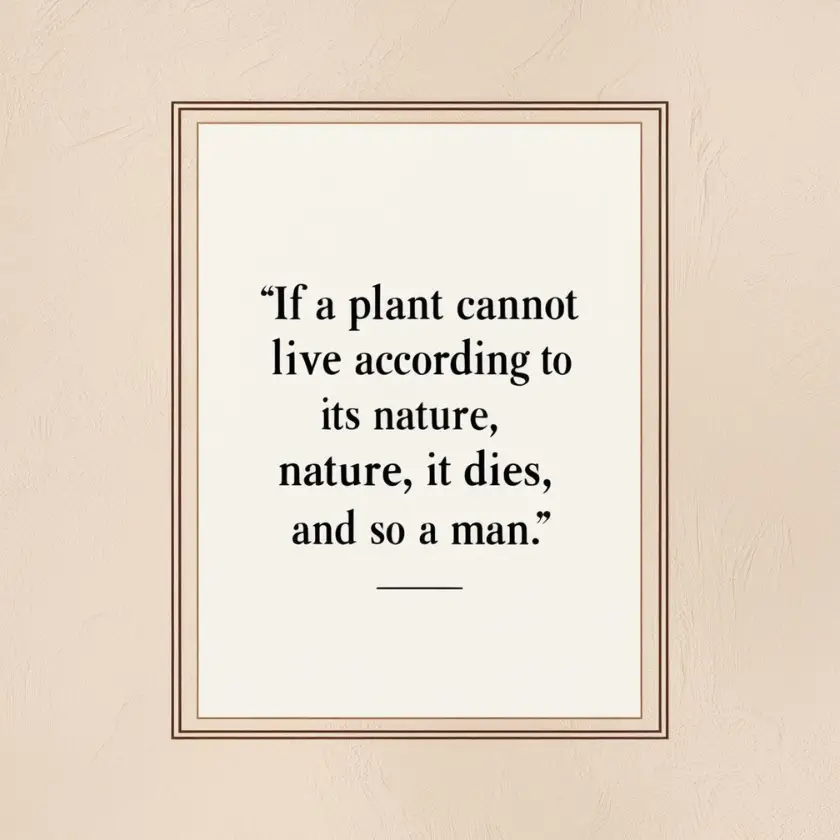
Moral Courage in Action: Quotes From The Novel Civil Disobedience
- “If the injustice is part of the necessary friction of the machine of government, let it go, let it go: perchance it will wear smooth—certainly the machine will wear out.”
Thoreau metaphorically illustrates the resilience required to confront systemic flaws, embodying key principles in Quotes From The Novel Civil Disobedience. - “If a plant cannot live according to its nature, it dies; and so a man.”
Thoreau underscores the importance of living authentically, resonating with the philosophical depth found in Civil Disobedience story themes. - “It is not desirable to cultivate a respect for the law, so much as for the right.”
This profound statement emphasizes moral justice over blind legality, central to Civil Disobedience quotes explained. - “The mass of men lead lives of quiet desperation.”
A reflection on societal conformity and discontent, this timeless observation enriches discussions in Quotes From The Novel Civil Disobedience. - “What is once well done is done forever.”
Thoreau reminds readers of the lasting impact of principled actions, a theme prevalent in famous quotes from the novel Civil Disobedience. - “A minority is powerless while it conforms to the majority; it is not even a minority then.”
This call for individuality emphasizes the importance of dissent in Civil Disobedience story analysis. - “There is but little virtue in the action of masses of men.”
Thoreau critiques collective morality, urging individuals to act independently, as discussed in Quotes From The Novel Civil Disobedience. - “The law will never make men free; it is men who have got to make the law free.”
This declaration challenges readers to redefine freedom through active engagement, a core idea in Civil Disobedience quotes explained. - “Disobedience is the true foundation of liberty. The obedient must be slaves.”
Thoreau’s argument for civil disobedience as an essential act of freedom resonates deeply within Civil Disobedience story interpretations. - “Under a government which imprisons any unjustly, the true place for a just man is also a prison.”
A powerful statement about solidarity with the oppressed, this line epitomizes famous quotes from the novel Civil Disobedience. - “I ask for, not at once no government, but at once a better government.”
Thoreau advocates for reform rather than anarchy, a nuanced stance found in Quotes From The Novel Civil Disobedience. - “The progress from an absolute to a limited monarchy, from a limited monarchy to a democracy, is a progress toward a true respect for the individual.”
This historical perspective underscores the evolution of justice, central to Civil Disobedience quotes explained. - “It is not so important that many should be as good as you, as that there be some absolute goodness somewhere; for that will leaven the whole lump.”
Thoreau highlights the ripple effect of integrity, a sentiment echoed in Quotes From The Novel Civil Disobedience. - “My civil neighbor, the tax-gatherer, is the very man I have to deal with—for it is, after all, with men and not with parchment that I quarrel.”
This humanizes Thoreau’s critique of systemic injustice, adding depth to discussions in Civil Disobedience story.
Resisting Injustice: Quotes From The Novel Civil Disobedience
- “When a sixth of the population of a nation which has undertaken to be the refuge of liberty are slaves, and a whole country is unjustly overrun and conquered by a foreign army, and subjected to military law, I think that it is not too soon for honest men to rebel and revolutionize.”
Thoreau passionately condemns systemic oppression, reflecting the transformative power of rebellion found in Quotes From The Novel Civil Disobedience. - “Those who, while they disapprove of the character and measures of a government, yield to it their allegiance and support, are undoubtedly its most conscientious supporters.”
This critique of passive compliance highlights the moral responsibility of citizens, integral to Civil Disobedience quotes explained. - “Any man more right than his neighbors constitutes a majority of one already.”
A compelling assertion of individual moral authority, this line forms a cornerstone in Quotes From The Novel Civil Disobedience discussions. - “A man has not everything to do, but something; and because he cannot do everything, it is not necessary that he should do something wrong.”
Thoreau emphasizes personal accountability, a recurring theme in the Civil Disobedience story. - “Action from principle—the perception and the performance of right—changes things and relations; it is essentially revolutionary.”
This statement captures the transformative power of principled action central to famous quotes from the novel Civil Disobedience. - “All voting is a sort of gaming, like checkers or backgammon, with a slight moral tinge to it, a playing with right and wrong.”
Thoreau critiques the superficiality of democratic participation, a recurring motif in Civil Disobedience quotes explained. - “I cannot for an instant recognize that political organization as my government which is the slave’s government also.”
This assertion of moral separation from unjust governance underscores the ethical dilemmas in Quotes From The Novel Civil Disobedience. - “There are nine hundred and ninety-nine patrons of virtue to one virtuous man.”
Thoreau’s observation critiques superficial morality, resonating with key themes in the Civil Disobedience story. - “Even voting for the right is doing nothing for it. It is only expressing to men feebly your desire that it should prevail.”
A call for active engagement over passive expression, this line is pivotal in discussions about Civil Disobedience quotes explained. - “I am too high-born to be propertied, to be a secondary at control, or useful serving man and instrument to any sovereign state throughout the world.”
Thoreau asserts his independence, embodying the spirit of resistance in Quotes From The Novel Civil Disobedience. - “I saw that the State was half-witted, that it was timid as a lone woman with her silver spoons.”
This vivid analogy critiques the fragility of unjust institutions, a theme in the Civil Disobedience story. - “The only obligation which I have a right to assume is to do at any time what I think right.”
Thoreau prioritizes moral integrity over legal obedience, a defining aspect of famous quotes from the novel Civil Disobedience. - “The authority of government, even such as I am willing to submit to, is still an impure one: to be strictly just, it must have the sanction and consent of the governed.”
This assertion calls for a participatory democracy, reinforcing themes in Civil Disobedience quotes explained. - “I simply wish to refuse allegiance to the State, to withdraw and stand aloof from it effectually.”
Thoreau’s personal declaration of noncompliance underscores his commitment to the principles in Quotes From The Novel Civil Disobedience.
Personal Responsibility and Action: Quotes From The Novel Civil Disobedience
- “If the injustice is part of the necessary friction of the machine of government, let it go, let it go: perchance it will wear smooth—certainly the machine will wear out.”
Thoreau compares governance to a machine, emphasizing the inevitability of resistance, a crucial point in Quotes From The Novel Civil Disobedience. - “But if it is of such a nature that it requires you to be the agent of injustice to another, then, I say, break the law.”
This powerful assertion encourages defiance against systemic injustice, echoing themes in the Civil Disobedience story. - “Under a government which imprisons any unjustly, the true place for a just man is also a prison.”
Thoreau’s recognition of moral alignment with the oppressed reinforces the spirit of resistance in Civil Disobedience quotes explained. - “A minority is powerless while it conforms to the majority; it is not even a minority then; but it is irresistible when it clogs by its whole weight.”
This line reflects the potential of collective resistance, integral to the Civil Disobedience story. - “What I have to do is to see, at any rate, that I do not lend myself to the wrong which I condemn.”
Thoreau underscores the importance of moral consistency, a key idea in Quotes From The Novel Civil Disobedience. - “It is not desirable to cultivate a respect for the law, so much as for the right.”
This statement challenges blind obedience to authority, a theme central to Civil Disobedience quotes explained. - “Law never made men a whit more just; and, by means of their respect for it, even the well-disposed are daily made the agents of injustice.”
Thoreau critiques the limitations of legal systems, a recurring topic in Civil Disobedience quotes explained. - “The mass of men serve the state thus, not as men mainly, but as machines, with their bodies.”
This line highlights the dehumanization of citizens under unjust regimes, aligning with themes in Quotes From The Novel Civil Disobedience. - “There will never be a really free and enlightened State until the State comes to recognize the individual as a higher and independent power.”
Thoreau envisions an ideal society, reflecting his hope for reform in the Civil Disobedience story. - “If the alternative is to keep all just men in prison, or give up war and slavery, the State will not hesitate which to choose.”
This critique of state priorities highlights systemic flaws, a theme in famous quotes from the novel Civil Disobedience. - “Let your life be a counter-friction to stop the machine.”
Thoreau’s metaphor encourages active resistance, a defining aspect of Civil Disobedience quotes explained. - “I do not hesitate to say that those who call themselves abolitionists should at once effectively withdraw their support from the government.”
This quote exemplifies Thoreau’s call for immediate action, central to Quotes From The Novel Civil Disobedience. - “A wise man will not leave the right to the mercy of chance, nor wish it to prevail through the power of the majority.”
Thoreau emphasizes individual responsibility over reliance on majority rule, resonating with themes in the Civil Disobedience story. - “Disobedience is the true foundation of liberty. The obedient must be slaves.”
Thoreau’s declaration asserts the fundamental role of dissent in achieving freedom, a core idea in Quotes From The Novel Civil Disobedience.

